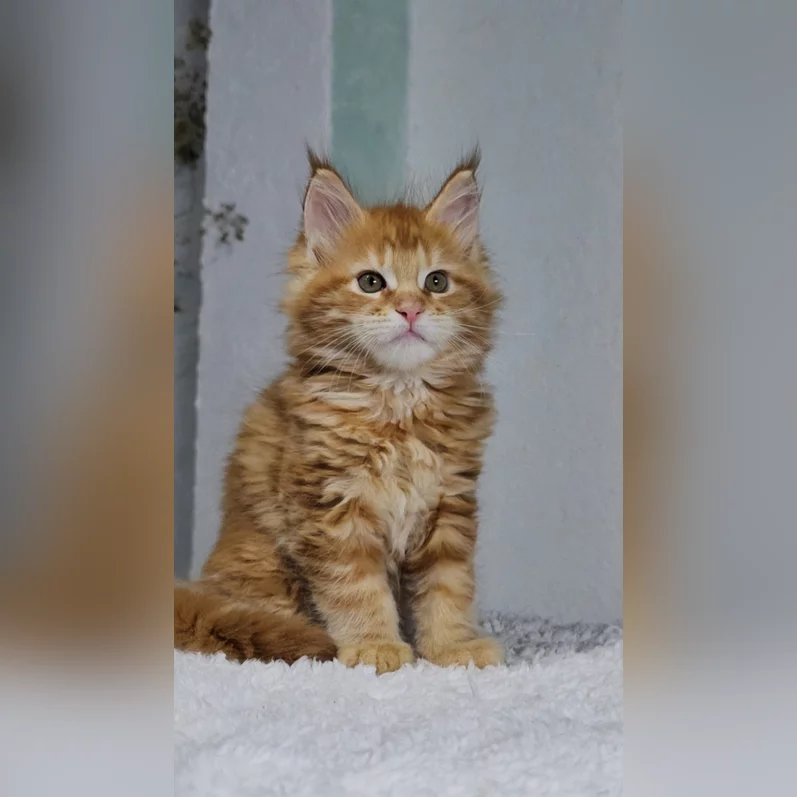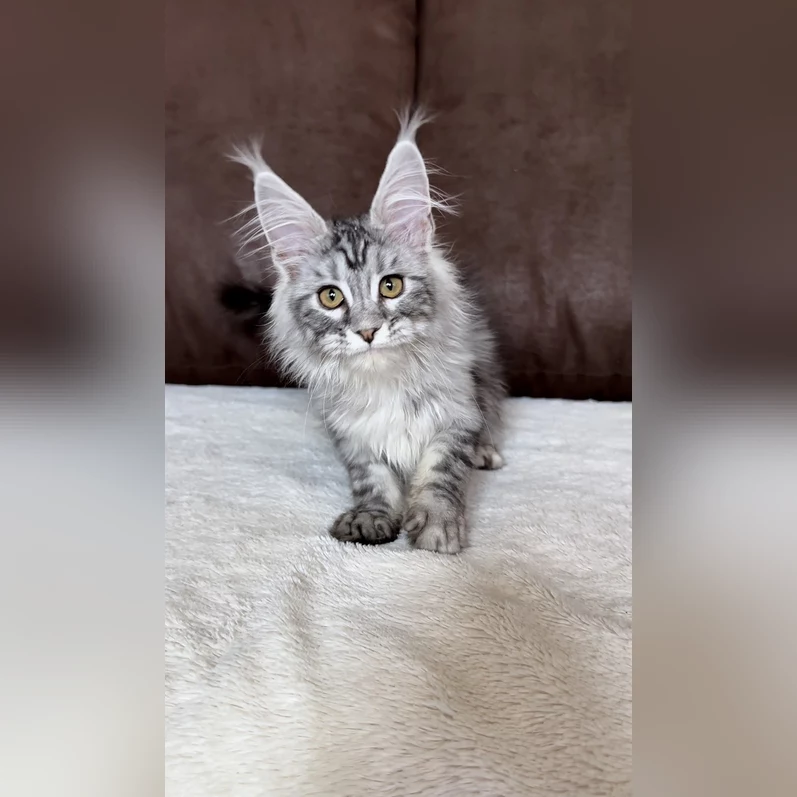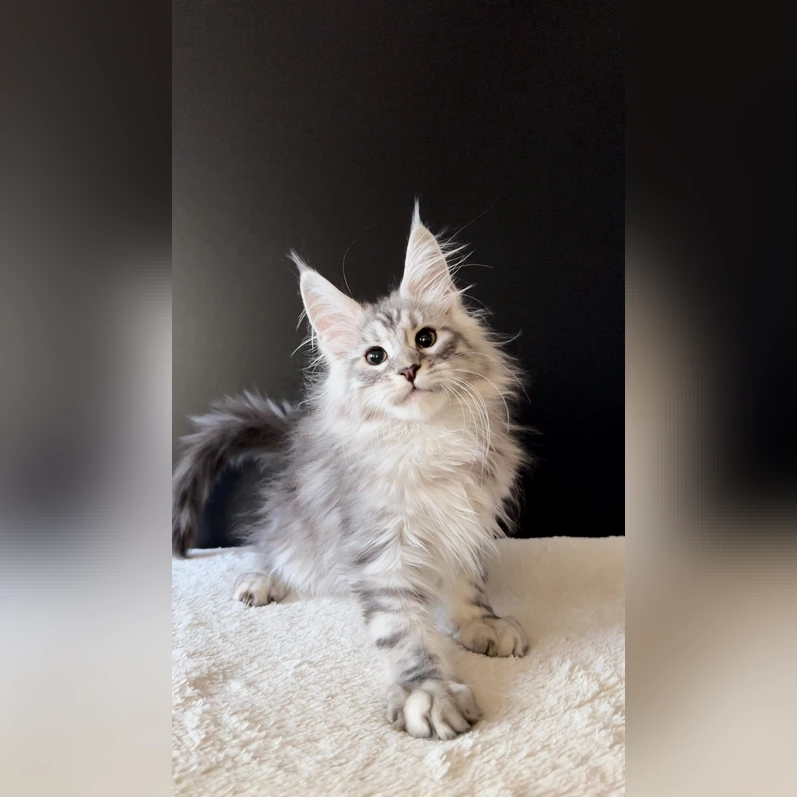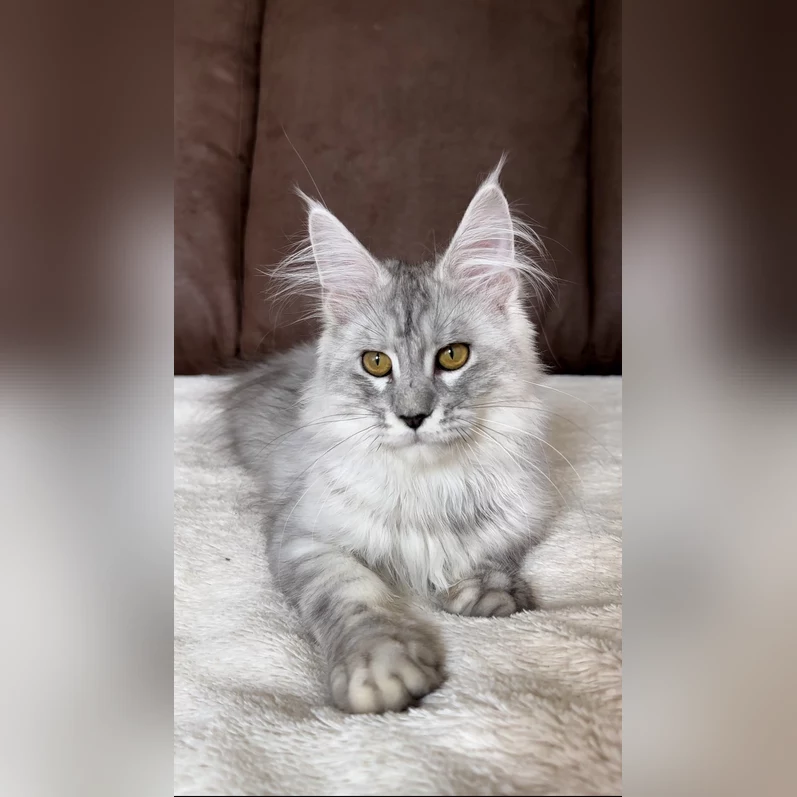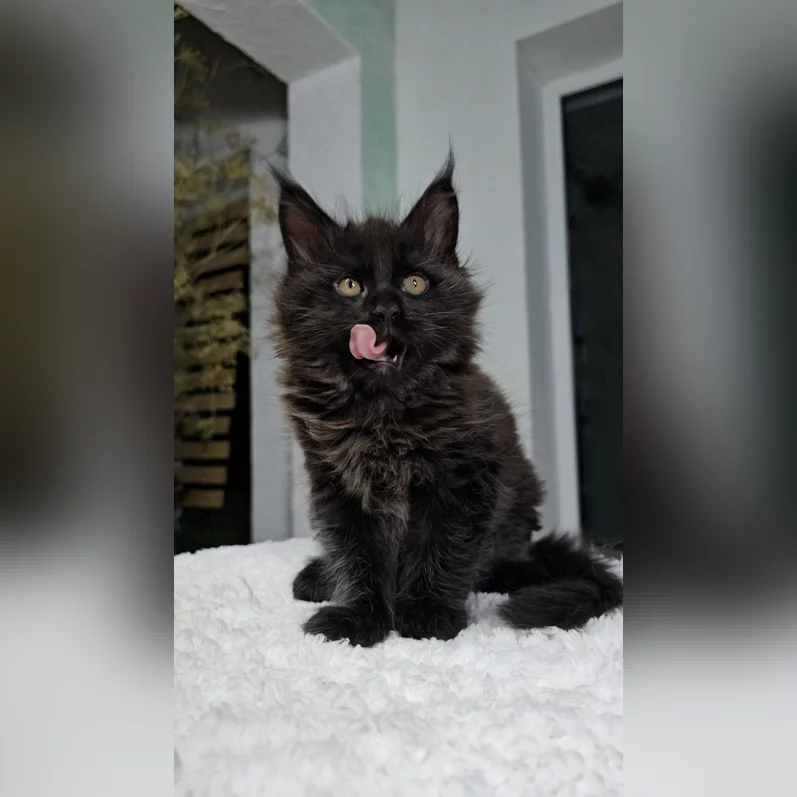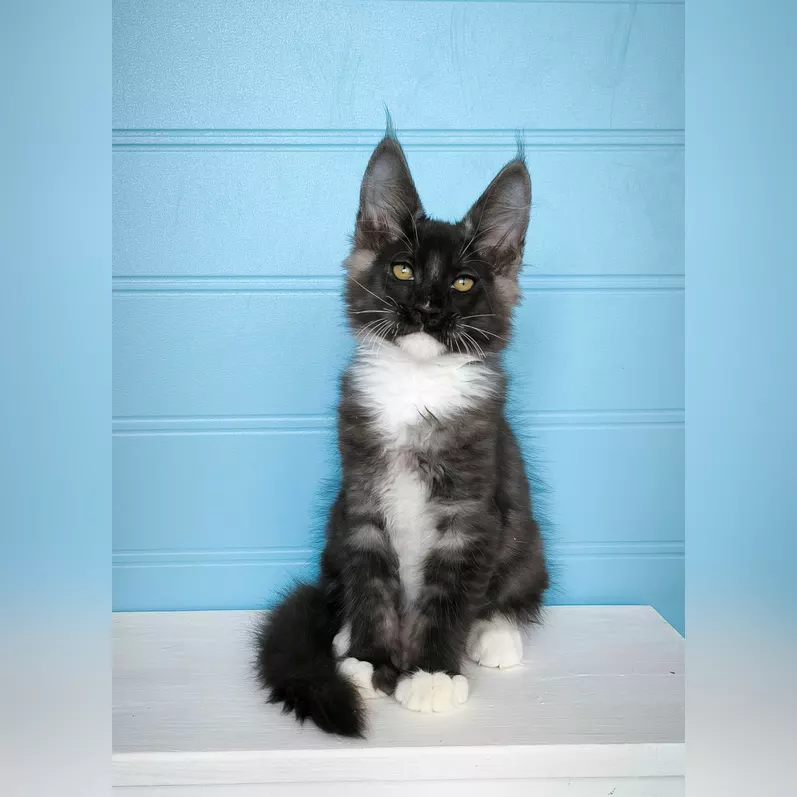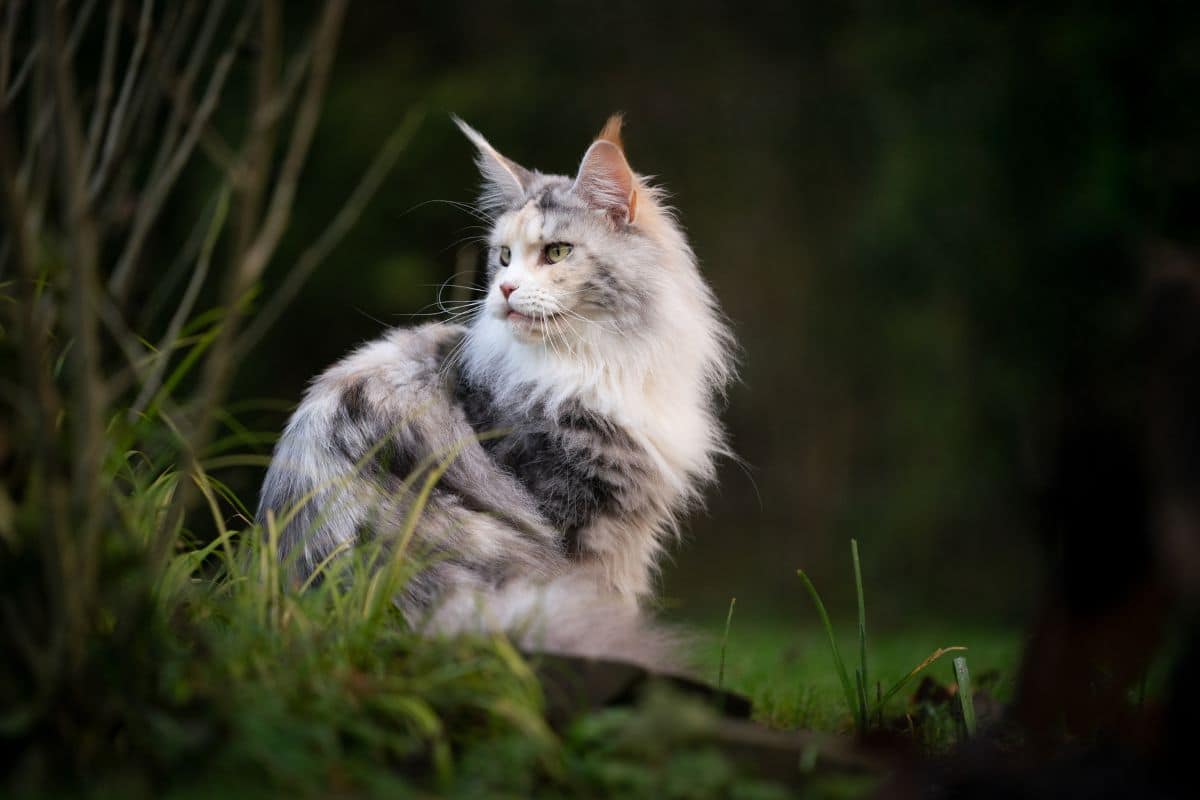
Black and White Maine Coon, Do Maine Coons Have Oily Fur?
Table of Contents
Black and White Maine Coon | Do Maine Coons Have Oily Fur?
Black and White Maine Coon are beloved for their long, shaggy coats, but owners who are worried about hygiene often wonder, do Maine Coons have oily fur?
Maine Coons have a naturally oily coat, which makes their fur semi-water-resistant. However, if a Maine Coon’s coat is exceptionally oily, especially on the face or at the base of the tail, it could be due to underlying skin conditions, or other health problems.
Maine Coons look exceptionally gorgeous, but a dull, oily coat can take away from your cat’s natural beauty, as well as indicate underlying health problems.
Read on to find out how you can keep your black and white Maine Coon coat in perfect condition!
Our Available Maine Coon Kittens For Sale
Baylis – Maine Coon Kitten(female)
Kongo – Maine Coon Kitten (male)
Ocean – Maine Coon Kitten (…
Kosmo – Maine Coon Kitten (male)
Olimpia – Maine Coon Kitten (female)
Nalle – Maine Coon Kitten (male)
Osiris – Maine Coon Kitten (male)
Keiko – Maine Coon kitten (female)
Jrebiy – Maine Coon Kitten (male)
Like – Maine Coon (Male)
Yason – Maine Coon Kitten (male)
Hanna – Maine Coon Kitten (…
Hitt – Maine Coon Kitten (male)
Frendy – Maine Coon Kitten (male)
Oskar – Maine Coon Kitten (male)
Haris – Maine Coon Kitten (male)
Yaguar – Maine Coon Kitten (male)
Maverick – Maine Coon Kitten (female)
Yohan – Maine Coon Kitten (female)
Malinka – Maine Coon Kitten (female)
Black and white Maine Coon cat – Do Maine Coons Have Oily Fur?
Black and white Maine Coon cat are longhaired, intelligent cats that are famous for their enormous size.
These gentle giants come in all sorts of colors and patterns, but their stunning looks aren’t the only reason they are so popular.
Over the past few decades, black and white Maine Coon cat have also become more and more popular for their loving, social personalities too.
Maine Coon Coat
Maine Coons are long haired cats with a unique coat.
They have a thick, double-coat, which helps insulate them against cold weather.
Their fur changes in length across their body, which is evident because Maine Coons have much longer fur around their shoulders and chest.
They are famous for the ruff or mane around their neck which makes them look like mini lions!
They also have longer fur on their paws, belly, and hind legs.
Maine Coons have especially thick fur in the winter, but the Maine Coon black and white summer coat is much lighter.
These cats shed seasonally, typically in the fall and spring, so their coat can protect them from extreme temperatures.
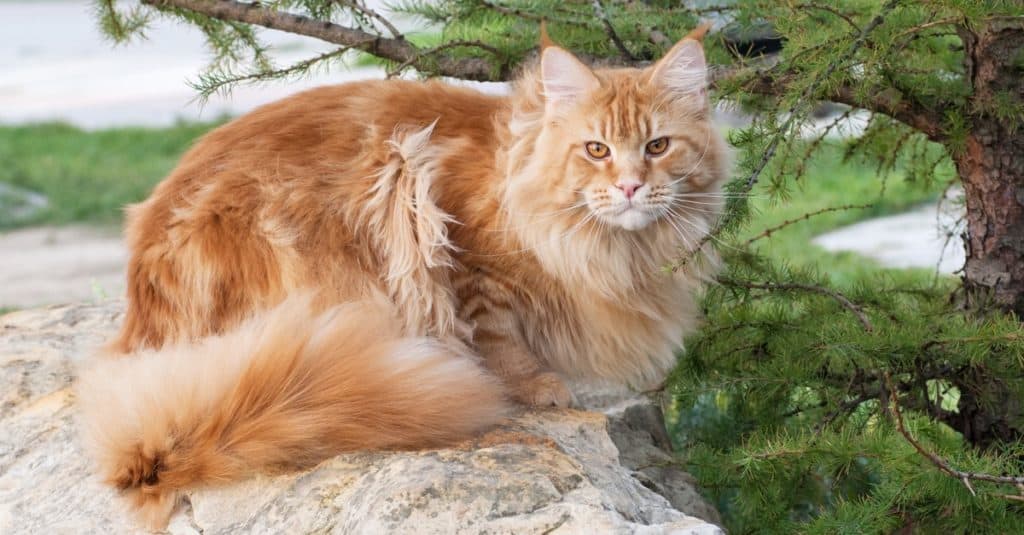
Maine Coon Oily Coat
While the Maine Coon’s thick, shaggy coat is one of the most famous traits of this breed, some owners worry that these cats have oily fur.
If this is one of your worries, keep in mind that all cats secrete oils from their skin which then coats their fur and keeps it moist and glossy, just like human hair.
So can cat fur get greasy?
The simple answer to this is that whilst the oil cats secrete adds shine and moisture to their coat, their fur should never be visibly greasy.
However, cats can develop oily coats if they begin to produce too many oils, which has often been caused by:
If you are worried that your Maine coon black and white has oily fur, please keep in mind that Maine Coons have more oily fur than most cats because their skin oils make their coats semi-water resistant.
Whilst this adaptation was a huge advantage many centuries ago when Maine Coons lived wild in the frigid, snowy state of Maine, it is less relevant in today’s world.
This is because in modern-day life most Maine Coon cats are now domesticated, living in lovely warm dry homes.
Maine Coon Fur
Have you ever wondered, do Maine Coon black and white have hair or fur?
Whilst this might sound like a silly question, it is actually a valid query that many people like to ask. This is what I tell them …
Cats, like all mammals, have hair. However, the term “fur” is often used to describe thick hair that coats an animal’s entire body.
Therefore, while cat fur is similar in structure to human hair, it is typically finer, softer, and grows more densely than the hair of a human.
So, do Maine coon black and white have soft fur?
Despite their somewhat oily coats, Maine Coon soft fur is still very common. In fact, the Maine Coon’s extra thick coat means their coat is far softer to touch than many other cat breeds.
Fluffy Maine Coons
If you have a Maine Coon kitten, you might be wondering, when do Maine Coons get fluffy?
Most Maine Coons start becoming fluffy when they are about two months old, but it can take up to four years for their full coat to develop.
What Makes A Cat’s Coat Greasy? (13 Causes)
While some amount of oil is important for protecting your cat’s coat and providing moisture, if you are wondering why your cat has greasy fur, there are a lot of potential underlying causes.

1. Natural Oils
For a longhaired cat, oily fur behind ears is actually relatively common. The fur behind a cat’s ears is softer and finer, which means it can be more easily affected by oils.
Furthermore, cats often have an especially difficult time reaching these spots.
2. Allergies
Allergies to food, dust, pollen, and other allergens can result in skin irritation, resulting in an increase in oil production.
Discover the 12 most common Maine Coon allergies in my article.
3. Old Age
As cats age, they may become too tired, stiff, or achy to properly groom themselves.
Senior cat greasy fur is unfortunately common.
4. Arthritis
Similar to old age, cats with arthritis will lose some flexibility and might be unable to groom themselves as well as they once did.
Other painful conditions like hip dysplasia or osteoporosis might also have the same impact on your cat’s grooming abilities.
5. Diet
Oily fur can be caused by a poor diet.
Nutritional deficiencies can lead to increased production of oils and other sebum, and will often also result in:
- Dull-Looking Fur
- Lethargy
- Other Symptoms
Keep your Maine Coons fur in great condition by feeding them these Maine Coon dry foods.
Alternatively, if a Maine Coon black and white raw food diet is your preference then make sure you read this article first.
6. Obesity
Obese cats often lose their flexibility and have a difficult time accessing every part of their coat while grooming.
7. Primary Seborrhea
Primary seborrhea is a rare skin condition that causes cats to produce more oils than necessary, resulting in a greasy coat, as well as clumped or uneven fur.
8. Secondary Seborrhea
Secondary seborrhea often results in the same symptoms as primary seborrhea but is due to an underlying cause rather than genetics.
Secondary seborrhea can be caused by:
- Worms
- Fleas
- Allergies
- Various Infections
9. Stud Tail
Stud tail, most common in males, can result in an oily patch on the cat’s back.
Stud tail is most common in unneutered male cats and is the result of overactive oil production at the base of the tail.
Maine Coon stud tail is often accompanied by:
- Crusty Buildup
- Distinctive Bad Odor
10. Hyperthyroidism
Hyperthyroidism increases a cat’s metabolism, often resulting in:
- Fur Loss
- Weight Loss
- Increased Appetite
Some Maine Coon cats with hyperthyroidism might also overproduce sebum and other skin oils, resulting in a greasy coat.
If you are wondering, why is my cat’s fur greasy and falling out then keep in mind that hyperthyroidism is a possible culprit.
11. Diabetes Mellitus
For a diabetic cat, oily fur is another possible symptom.
Some cats with diabetes might develop a dull greasy coat, as well as dandruff.
12. Mouth And Dental Diseases
Mouth and dental diseases can cause pain while grooming.
Cats with periodontal disease and similar conditions often show a decrease in appetite, as well.
Learn more about this potentially fatal teeth disease in my article ‘Maine Coon Teeth: Important Facts To Know‘.
13. Other Underlying Conditions
It is possible for a cat’s coat to become greasy due to a number of underlying health conditions, such as these common Maine Coon health problems.
Therefore, if you are worried about your cat’s oily fur, make sure to schedule a vet appointment to rule out any dangerous health problems.
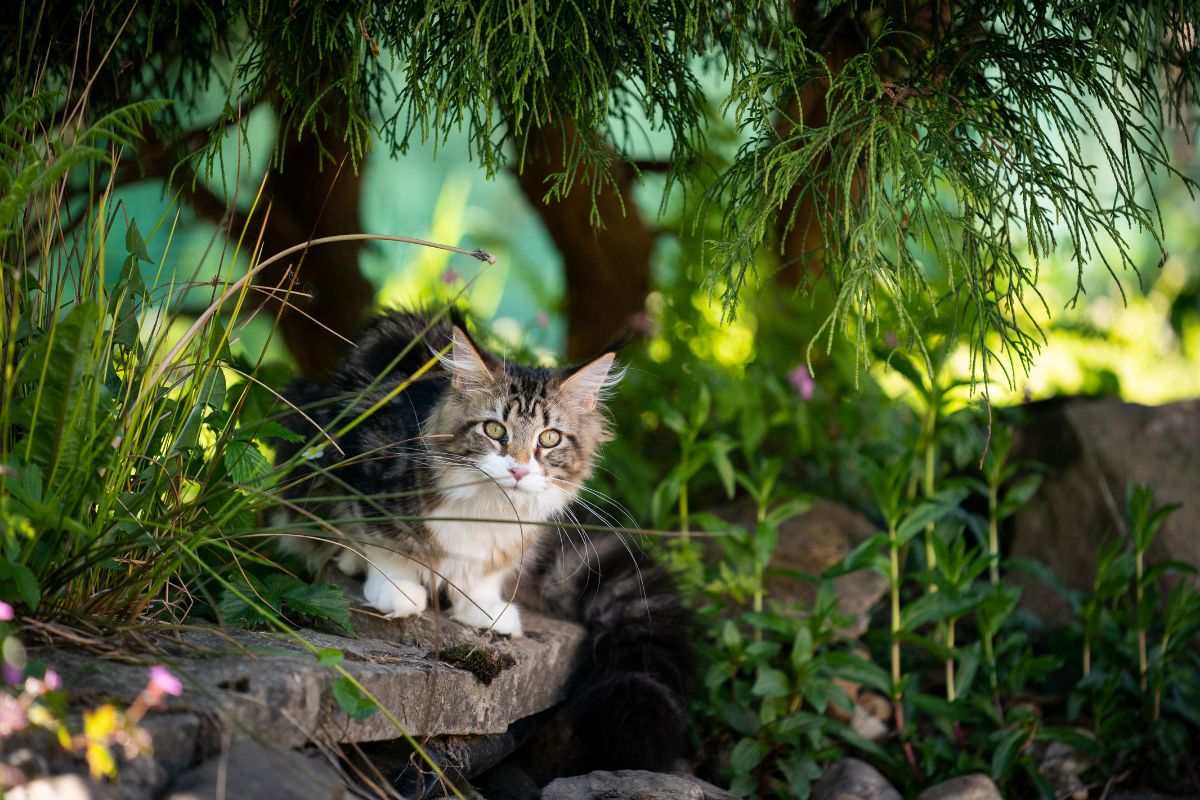
How To Treat Oily black and white Maine coon kittens Fur
Black and white Maine coon kittens are revered for their naturally stunning appearance, but a cat with an oily, dull coat will hardly resemble the true beauty of the Maine Coon.
More importantly, however, is the fact that oily fur is about more than your cat’s appearance; it is almost always a sign of poor hygiene or underlying conditions.
Learning how to get rid of greasy cat fur is therefore essential for keeping your cat clean, healthy, and looking as gorgeous as possible!
1. Grooming
Greasy coats are often the result of poor hygiene habits.
Many cats are unable to properly care for themselves due to:
- Arthritis
- Old Age
- Obesity
- Other Medical Problems
While it is important to treat the underlying cause of your cat’s poor grooming habits, you should also help your cat by taking proper care of its coat.
Maine Coons should be brushed at least two or three times a week, and possibly more during shedding season.
To enable successful grooming, make sure you have these six grooming brushes handy.
Whilst six might initially sound like a lot, keep in mind that each brush is different with its own unique purpose.
2. Bathing
So do Maine Coon cats need baths, or is this just a fallacy? Make sure you read the full story before jumping to any conclusions.
It is no secret that most cats hate water, but black and white Maine Coon kittens are unique because they usually love the water because of these reasons.
Even if your Maine Coon hates baths though, you can still keep your cat clean by gently wiping the Maine Coons fur with a damp washcloth.
Alternatively, the methods listed in this article are also great ways to keep a Maine Coons fur clean.
If you have often wondered why does my cat’s fur look separated, then your cat likely has a buildup of grease and dirt in its fur, which causes it to clump and separate. In such cases, it is important to thoroughly bathe your cat’s coat and remove this buildup.
Use a pet-safe, vet-approved degreasing shampoo to safely remove your cat’s oily buildup.
3. Coat Trimming
The Maine Coon’s long fur may look beautiful, but it can become dirty, matted, and greasy if it is not managed properly.
Maine Coons have longer fur around their paws, toes, and hind legs.
Outdoor cats are even more prone to getting:
- Muddy
- Tangled Fur
Sick or senior cats may develop clumps of excrement near their bottoms if it becomes tangled in their fur. Learn more about this issue.
If you notice any clumps or tangles on your cat’s body, it might be time to trim away some of the excess furs to maintain your cat’s hygiene.
4. Diet Change
Sometimes, a dull, greasy coat is due to a nutritional imbalance, or obesity.
Obese cats are unable to reach every part of themselves and should be put on a vet-approved diet.

Black and white Maine Coon kittens
Cats with nutritional imbalances should be fed high-quality food with:
- High amounts of protein
- Moderate amounts of fat
- Low amounts of carbohydrates
- Low levels of grains and filler content
You should also talk with your vet to make sure your cat is getting all of the vitamins and minerals it needs.
5. Pain Relief
Black and white Maine Coon kittens suffering from arthritis, hip dysplasia, or other painful conditions often cannot groom themselves as they once did.
Alongside grooming and bathing your cat more frequently, you should also consult with your vet about pain management.
The following can also help relieve your Maine Coons pain:
- Pain Relievers
- Decreased Exercise
- Accessible Furniture (to prevent excess climbing and jumping)
6. Medication
Sometimes, cats develop oily fur due to underlying parasites or infections.
Your vet will be able to prescribe antibiotics, antifungal medications, or any other necessary medications to help your cat get better.
7. Schedule A Vet Appointment
Ultimately, a greasy coat should be a cause for concern for any cat owner.
Take your cat to the vet immediately if its oily fur persists for several days, particularly if you notice other symptoms such as lethargy or itching.
Maine Coon Grooming Tips
Cats are fastidious groomers, but even the cleanest of cats need a little help from their owners from time to time.
It is important to establish a grooming routine to regulate your cat’s hygiene.
Here are some tips for grooming your Maine Coon cat:
a. Brushing A Maine Coon Cat
Brushing is an essential part of caring for any cat, but this is especially true for Maine Coons since these longhaired cats are prone to tangles and matting.
If you do not brush your cat enough they may end up swallowing a lot of hair while grooming themselves, which can lead to hairballs.
Watch out for over brushing though; as daily brushing can irritate your cat’s fur and even result in bald patches!
With this all in mind, a Maine Coon should therefore be brushed at least two or three times a week with a slicker brush which is effective at removing the dead hairs from your cat’s thick undercoat.
Maine Coons have long, thick coats in the winter, and shorter, thinner coats in the summer so they can better adapt to temperature changes.
Between seasons, Maine Coons shed a lot and will need some extra grooming to remove excess fur.
Therefore, it is important to remember that during the spring and fall you will likely have to increase your cat’s brushing schedule due to their increased hair shedding cycle.

b. Cleaning Your Cat’s Face
Cats often produce a lot of oils on their faces and ears, and some might even develop acne as a result.
To help avoid this use a damp cloth to gently wipe your cat’s face, particularly around the eyes, lips, and chin.
For more information on Maine Coon acne make sure you read this complete guide.
When it comes to cleaning your cat’s ears, only use a cloth or cotton ball to avoid damage to your cat’s precious ears.
You should also only clean their ears once every two or three months to avoid irritation.
However, if your cat regularly has oily ears, or ears that are filled with debris, then it is likely suffering from some underlying condition and should be taken to the vet.
c. Bathing A Maine Coon Cat
Most cats only need to be brushed, but in some cases, a deeper clean is necessary through bathing.
So, how often should a Maine Coon be bathed?
Realistically cats usually only need to be bathed once every one or two months. However, the answer will ultimately depend upon the condition of your cat’s coat, as well as your cat’s feelings toward baths.
For instance, if your cat hates baths and becomes quite stressed because of them, you should only bathe your cat as and when it is absolutely needed.
Alternatively, if your Maine Coon loves water then it might be a good idea to set up a regular bathing schedule for them.
How To Bathe A Maine Coon Cat
- Before starting the bathing process for your cat, make sure that you brush them beforehand to remove your cat’s dead hair.
- For cats that dislike baths, it is usually a good idea to make sure your cat is calm and tired when bathing. This is because a cat that is full of energy is more likely to put up a fight during bathtime!
- You should also make sure you have placed a rubber mat or towel in the bottom of your bathtub so that your cat has something safe to grip whilst being bathed.
- Fill the tub with a few inches of warm water and place your cat in the tub.
- Instead of submerging your cat entirely underwater, use a cup, container, or gentle water sprayer to get your cat wet.
- Then, massage the cat shampoo into your cat’s fur. Make sure you only use cat-safe shampoos like these or consult a trained vet who is able to recommend ideal cat shampoos based on your pet’s individual needs. For example, cats with particularly oily coats often need a degreasing shampoo to remove excess buildup.
- Rinse your cat’s fur with water.
- Afterward, gently dry your cat with a warm towel and give it a few treats to make bathtime a more positive experience.
d. Trimming Your Cat’s Fur
Since Maine Coons are long-haired cats, they are more prone to tangles and mats.
The long fur around their paws and hind legs is especially prone to matting.
Senior, obese, and outdoor cats are all more likely to have dirty or tangled fur.
While bathing and brushing can help prevent this, it is also a good idea to trim excess fur when necessary.
If your cat has a lot of mats it can be dangerous to groom your cat yourself; sometimes, it is nearly impossible to remove a mat without cutting into your cat’s skin by accident.
Should you not feel comfortable grooming your cat by yourself, find a reputable groomer who you trust to take good care of your cat.










